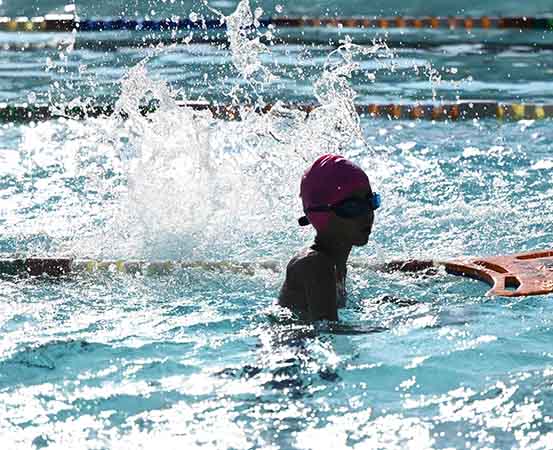
Swimming provides a wholesome full-body workout with both physical and psychological benefits. While many people reserve a couple of days in their weekly workout schedule for the pool, for some it is their primary exercise.
A typical session in the pool for most would last anywhere between 45 minutes and an hour. And since people are in water, there is a tendency to ignore having fluids while doing the laps.
This is a mistake, say experts, reiterating that dehydration occurs while swimming too, just like during any other physical exertion.
Loss of water and salts takes place during swimming. And if a swimmer gets dehydrated while in water, it can lead to cramps and other physical issues related to loss of fluids. Cramping up in water can be hazardous too.
A 2021 research report concluded that there is a risk of dehydration in swimmers, especially when swimming is done for longer durations or in hot weather. So, it is important to have a hydration plan in place while training in the pool.
Dehydration and swimming
“Dehydration is an important aspect in swimming,” says Rajkumar Chandran, head coach at ACE Sports Club in Dubai, UAE. “In land-based sports an athlete is able to see the sweat but in swimming it is swept away with water as soon as it appears on the skin.”
The body keeps losing fluids even after the swim.
“Dehydration occurs before, during and after the swim,” adds Chandran. “Before getting into the pool, it is important to drink plenty of water. If someone is practising for a longer duration, then it is important that a break is taken every 20-30 minutes and electrolyte water is taken. The third aspect is generally ignored by many: after completing the swim, it is important to drink water as loss of water will continue taking place.”
You should avoid drinking cold water because the temperature of body remains high during the physical activity and consuming chilled water is not good for the body.
Chandran advises his trainees to consume water at room temperature, which can be taken with one or two teaspoons of pure honey. “Tender coconut water can also be consumed,” he says.
It is also important to look out for symptoms of dehydration. The best way is by observing the urine colour: if it is dark yellow after the session, then it’s a warning sign that the body is dehydrated.
Food helps avoid swimming dehydration
Dehydration also depends on the food consumed, or rather not consumed, before a swimming session.
“Dehydration can occur if the swimmer has not consumed any food for, say, four hours prior to swim,” says Raj Kumar, a Delhi-based coach and founder of Raj Swimming Academy. “You should eat something at least 30 minutes prior to swimming, but it should not be a heavy meal.”
Takeaways
- Like during other sports or physical activities, dehydration can occur while swimming as well.
- Consuming water before, during and after a session in the pool is important to avoid dehydration.
- You should avoid drinking chilled water after a swim because the body will be at a higher temperature because of the physical activity. Having a high-energy snack half an hour or so before a swim will also help in keeping dehydration away.

















